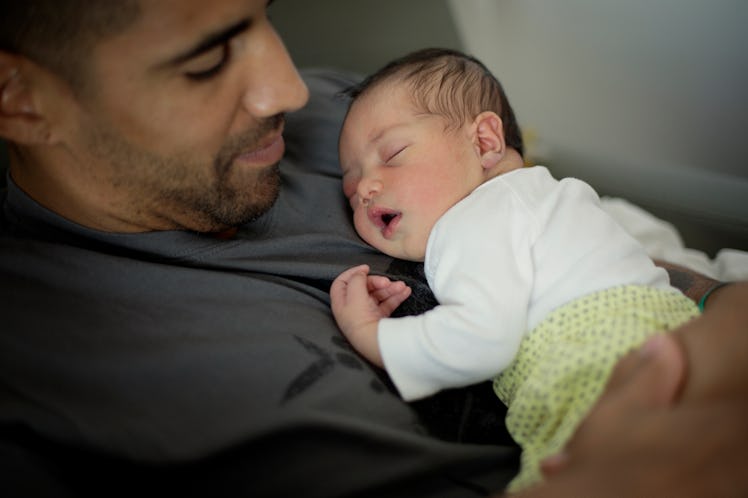Why Do Newborns Hiccup A Lot? For Brain Development. Seriously.
Baby hiccups might seem like a strange quirk or muscle development, but they're so very much more than that.

Newborn babies don’t do much else besides eat, poop, cry, sleep, spit up, and hiccup. Though most of these actions make perfect sense, hiccups seem like a useless muscle reflex that’s just got to be unpleasant for the child. Well, it turns out hiccups are neither meaningless contractions nor causes for alarm. Weirdly enough, a new study finds they may play a vital role in babies’ brain development.
Curious why babies, especially preemies, hiccup so much, University College London researchers monitored 13 newborns with persistent hiccups. By attaching brainwave-tracking electrodes to their scalps and movement sensors to their torsos, they discovered that each time the diaphragm muscle contracts, causing a hiccup, it triggers three large brainwaves within the cortex. Because the third wave resembles those provoked by noises, the researchers believe this signal allows babies’ brains to connect the “hic” sound of a hiccup to the sensation of their diaphragm muscle contracting.
It turns out this connection is wildly important. “The hiccup sends sensory information to the brain that babies use to ‘learn’ about their body map so that later they can control their respiration voluntarily,” says lead investigator Lorenzo Fabrizi, Ph.D. In other words, these brainwaves teach babies how their bodies are constructed, as well as how breathing feels, so that when they’re older, they’ll know how to regulate their breathing on their own.
Interestingly, this process begins long before babies are born, as early as nine weeks into pregnancy. “Fetuses hiccup a lot, and moms can feel it through their bellies,” Fabrizi says. Kicking in the womb, which pregnant people also feel, likely serves a similar purpose of wiring babies’ brains and helping them map out their bodies, as Fabrizi’s team discovered in earlier research.
Once little brains have made these connections, hiccups no longer serve a purpose. This is likely why they become less and less frequent as children age. Of course, they never go away completely. The researchers suspect grownup hiccups are just a hangover from our early developmental stages.
Even though baby hiccups are perfectly normal, they still make many parents fret. “I think parents worry because hiccups are annoying for us as adults, so we assume that they must be annoying for babies too,” Fabrizi says. “However, some babies even hiccup while they are asleep.”
Lord knows you’ve got enough to worry about as a parent of a squirmy, needy, lovable infant, so go ahead and knock hiccups off the list.
This article was originally published on